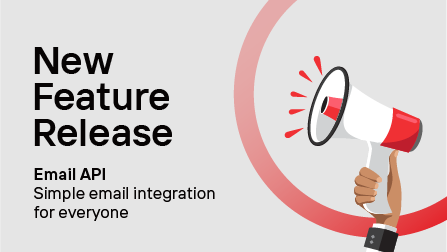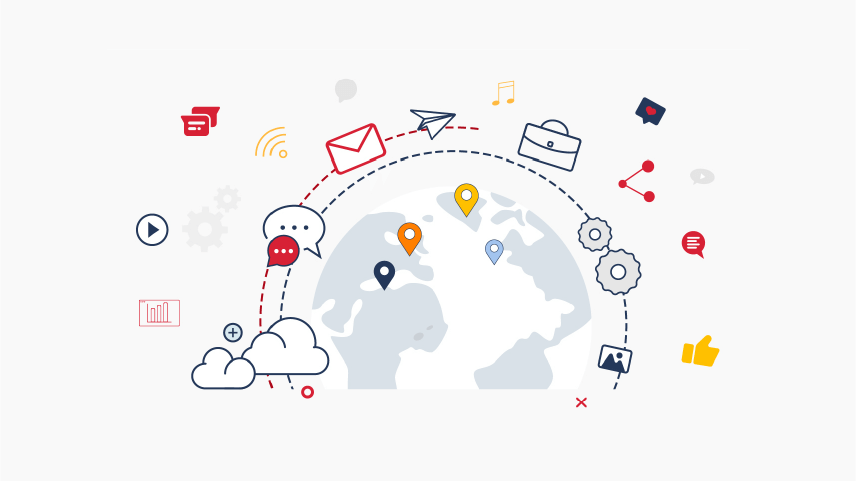The digital frontier has massively changed during the past two decades, evident with the prevalent use of the internet, mobile users and their use of social media. To date, more than half of the world’s population is now online; there are five billion global mobile subscribers and more than 3 billion active social media users. The digital sphere has permeated nearly every human aspect, from the way people socialize, gather information and, moreover, the way businesses communicate with their customers – disrupting every aspect of business, government and individual’s lives. The Middle East and Africa (MEA) region is no exception.
The Digital Boom Sweeping Across the Youthful Middle East and Africa
Although the region has traditionally been a laggard in the adoption of global trends, it has emerged as one of the most active technology consumer markets courtesy of a large addressable market, a young digitally savvy population, and mobile native societies. In the Middle East alone, mobile subscriptions have amassed to 312 million, mobile penetration rates are at a whopping 127%, and there are 93 million active social media users (at a 38% penetration rate), according to the 2018 Global Digital suite of reports from We Are Social. Certain countries such as Bahrain, Qatar, and the United Arab Emirates boast 70% social media adoption – a strong indication that the consumer’s enthusiasm is driving the Middle East’s digitization charge.
Conversational Agents in MEA – Shifting Beyond the SMS
In the late 90’s, back when internet connectivity was a luxury to the masses, SMS reigned king in the messaging scene, be the messages for business purposes or social interaction. A decade later and the messaging terrain has drastically changed, albeit for the interpersonal communication only as ChatApps has revolutionized personal messaging. However, businesses still prefer to use SMS when communicating with their customer base – from sending promotional texts, or for verification purposes, or to send transactional reminders.
ChatApps
The introduction of ChatApps, such as WhatsApp, Facebook Messenger has transformed the way people communicate and consume data. ChatApps allow users to send pictures, videos and locations, send and receive voice and video calls, and participate in group chats, all through the internet.
Compared to a regular text message, it is more engaging, convenient, and cheaper for an average Joe to use ChatApps compared to the bland and costly 160-character text message. Latest statistics indicate that over 65 billion messages are sent on a daily basis on WhatsApp, in addition to the 2 billion minutes of video and voice calls that are made every day.
The top messenger app in 128 countries around the world is WhatsApp, followed by Facebook Messenger. That also holds true for the MEA region, where WhatsApp and Facebook messenger dominate the ChatApps in terms of use according to the latest data from SimilarWeb.
RCS
Rich Communication Services (RCS) is a new messaging protocol meant to supplant the SMS, the next generation of SMS or “SMS 2.0” if you will. It’s an industry effort to upgrade the messaging experience through enabling SMS with rich media, 1-to-1 and group messaging, video, picture, and file sharing, branding, and better analytics. Users of the Chat, the consumer-friendly name of RCS, will get the features that are almost standard in the current ChatApps.
Chat, once wholly rolled out, will be a service built into Android devices, not an app. It will not be an additional app you have to download and will be a better and improved version of the SMS. As such, it needs carrier support, and your device needs to support it before it can be available for rollout. The expectation is that by 2019, Chat will be available for the public.
Bots
Chatbots have been slowly cropping up on our favorite websites over the last few years, and it seems that chatbots are here to stay. They are a part of the digital landscape, streamlining support communications and answering questions. Essentially, chatbots are merely computer programs that talk like people. Entirely digital, these bots usually use written speech to gather information, answer questions and handle basic, Tier 1 support issues.
To date, there are more than 300,000 active chatbots on Facebook Messenger, resulting in an improved customer service experience and an overall increase in sales.
The Question now is... What does the future hold for MEA’s business messaging scene?
When thinking about the future of MEA’s business messaging scene, there are many factors one must consider before deciding what’s next. Each of the ChatApps, RCS, and Chatbots have pros and cons of which will sway how the future pans out.
1- Reliability and Trustworthiness
One of the primary reasons for the SMS’s popularity for business messaging was its trustworthiness. The 98% open rates and the almost guaranteed delivery of the SMS was why it has been used for authentication purposes, transactional messages, and payment reminders. The fact that the SMS has to go through the operator gateways before reaching the end user and that its governed by local regulators gives it an added layer of security.
It seems the RCS’s Chat may have the upper hand when it comes to reliability. It will be backed by operators after all. Businesses and users will have to verify their identity, and it will work even when an internet connection is not available, almost guaranteeing deliverability. ChatApps and Bots rely on a user having an internet connection and on having a particular app downloaded to communicate, a barrier to many who prefer simpler communication means.
2- Availability
When RCS does take off, it will only be available to Android users leaving all Apple users out in the cold. It is not clear yet how RCS and iOS users will work together (if at all). ChatApps, on the other hand, are widely available across all devices, are platform independent, and users are able to easily use them. Although Chatbots has gained a lot of momentum in the past few years, it's still in the early stages, and businesses have yet to understand their full potential and for them to migrate to the use of bots.
3- Branding, Enhanced Customer Experience, and Ease of Use
RCS, ChatApps, and Bots all offer advanced features that allow users to easily share files, photos, videos, locations, and even live streams. The trio also gives brands insights on how their customers are engaging with their messages, allowing them to constantly change and improve the way they communicate. Effectively, they provide a more appealing user experience, a better understanding of consumers and their needs, and a more engaging communication experience.
The Bottomline
Given the rapidly shifting landscape of the digitization charge, what worked well yesterday is bound to change by tomorrow. And given the tremendous possibilities of RCS, ChatApps, and Bots, the reality on the ground is much different.
From our many conversations with existing and potential customers in the region, we have arrived at a number of conclusions.
- The MEA region has a lot of people without a smartphone and has many with handsets without the ability to receive rich messages or connect to the internet. Hence, SMS will still be the de facto mode of communication, especially for authentication and One Time Passwords (OTPs), especially for the financial sector.
- Although many businesses want to go digital, strict regulations are the primary driving compass. For example, some banks in MEA love the idea of bots but deem incorporating them as an official channel to perform financial transaction out of the question, for the time being at least.
- There’s an undeniable pull for businesses in the region for the use of WhatsApp and RCS. Enhanced user experience is a key driver for both. For WhatsApp, it’s fueled mainly by the popularity of the app among the population where end users are demanding more interaction on their favorite tool. Businesses, on the other hand, are leaning more towards the use of RCS, as it will still be governed by the most regulated communications entity, the Mobile Network Operators (MNOs).
- Many enterprises in the MEA region fully understand the benefits of going digital but they struggle with their existing legacy systems which often hinders any new implementations.
It is all about effective communication – reaching the customers the way they want to be reached. There’s no “one size fits all” communication tool. This translates into businesses effectively choosing what’s right for them and what tools can digitally transform their business, thus propelling their business towards the future. This is what CEQUENS has set out to do, finding the right solution for businesses. We believe that the messaging playground is big enough to sustain all sorts of messaging, but to be successful, you need to tailor your choice according to the needs of the business and their customer base.
Editor's Note: A version of this article appeared on TADs Blog.
CEQUENS Can Help
We're a leading Communication Platform as a Service ( CPaaS ) provider in the Middle East and Africa (MEA) region that aims to bridge communication gaps in a communication-driven world.
Powered by innovation and guided by a Cloud-First and Mobile-First approach, we provide omnichannel communication APIs that enable enterprises and developers to communicate with their customer base worldwide.
As an Endeavor Entrepreneur and GSMA Associate Member and ISO-Certified company, CEQUENS plays a pivotal role in transforming communication in the region.
CEQUENS proprietary, PCI/DSS compliant Communication Platform leverages the latest cloud technologies and features a comprehensive portfolio of products and solutions that are industry-focused, agile, scalable, and cost-effective.


